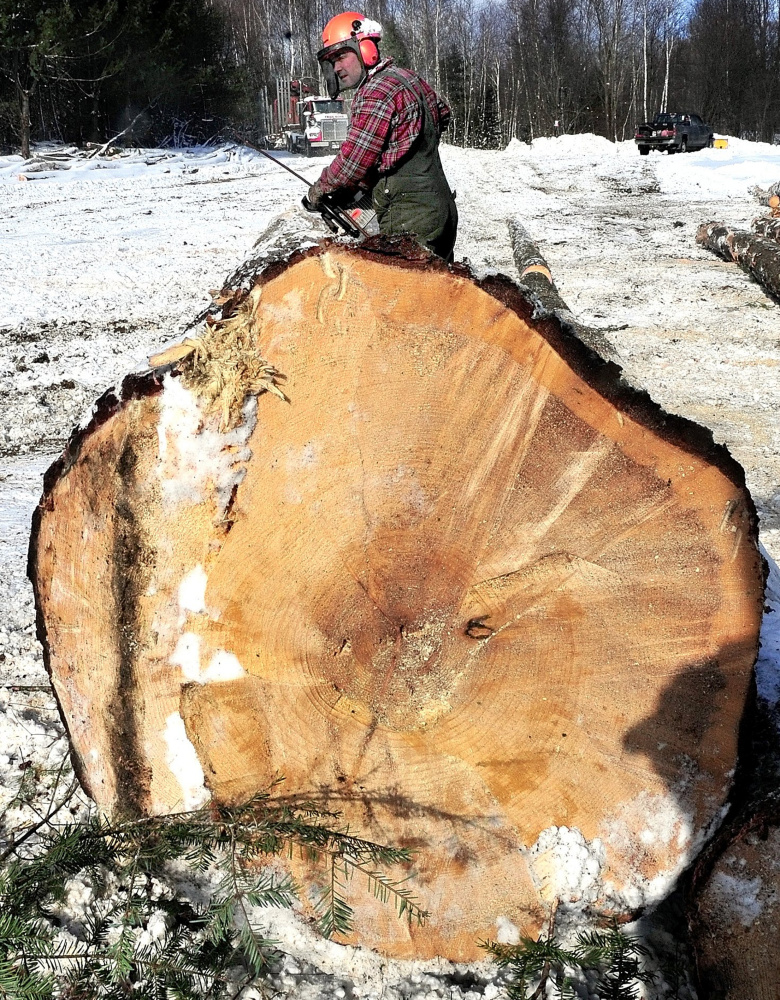The LePage administration is seeking help to “stem the slide of Maine’s forest products industry” and identify additional wood markets following mill closures and other events that have rocked the state’s forest-based economy.
The Maine Forest Service plans to hire a temporary “point person” – or a firm – to find ways to strengthen and expand a key part of the state’s economy that the agency says is “at a critical turning point.” The closure of five Maine paper mills in two years, global competition and shrinking demand for so-called biomass products have, for the first time in three decades, left some woodland owners without a market.
“It’s not related to any specific incident – it was the cumulative effect,” Don Mansius, director of forest policy and management at the Maine Forest Service, said of the project. “Until recently, we could say that Maine wood owners had a market for every stick, but that is not the case now. So we are looking for opportunities to revive the forest products industry.”
The envisioned contractor position – advertised in a “request for proposals” released last week – is one of several efforts underway at the state, federal and industry level to help a sector that not long ago was the largest economic engine in Maine. It is unclear how those efforts will mesh together, however.
In August, for instance, two dozen federal officials representing eight agencies came to Maine to work with the forest products industry to devise a plan forward after several pulp and paper mill closures. Yet Gov. Paul LePage – an outspoken critic of President Obama – did not send anyone from his administration to participate in the high-profile tour, despite the fact that members of Maine’s congressional delegation requested the visit by the federal “assessment team.”
The LePage administration’s latest request for proposals is financed with the help of a federal grant from the U.S. Department of Agriculture.
The winner of the contract – worth up to $210,000 over three years – would be expected to research new opportunities for Maine wood products while actively marketing the state’s industry to potential investors via a “What Maine has to Offer” guide.
Additionally, the contractor would identify bottlenecks to new investment or policy issues hurting the current industry. The person or firm would also work to improve relations and communications between the forest products industry and the state about the situation on the ground in order to avoid surprise announcements such as mill closures or major cutbacks.
CHANGING MARKETS
Players in Maine’s forest products industries are trying hard to adapt to changing markets, such as three paper mills that recently converted machines to produce specialty products.
The official “request for proposals” and the application for federal funds lays out both the challenges and opportunities, saying that the project’s resulting investments of state, federal and private resources will “help stem the slide of Maine’s forest products industry and . . . assist in a turnaround.”
“Maine’s forest-based economy is at a critical turning point,” reads the request for proposals. “Although closures of wood processing facilities have affected all states over the last two decades, until recently, Maine has been able to weather industry downturns, and even the loss of some sectors of the forest products cluster.”
But the loss of three large paper mills in 2014 and 2015, cutbacks at others and dropping demand for wood for biomass energy “has tipped the scale,” reads the document.
Maine is the most heavily forested state in the nation, with 95 percent of that land in private hands. Although still a major pulp and paper producer, the sector in Maine has lost 2,300 jobs in a five-year span amid falling demand and increasing competition domestically, globally and with producers in Canada.
There is still strong demand for hardwood products and wood for lumber from Maine’s forests. However, demand for the type of low-grade softwood used by mills or biomass plants has fallen by roughly 50 percent in recent years, said Patrick Strauch, executive director of the Maine Forest Products Council.
Strauch said the Maine Forest Service’s proposal is timely because similar discussions are happening within the industry and academic community in Maine. Those efforts appear to be complementary as all parties try to come up with a road map – or maps – to help the industry diversify and grow amid changing global markets, Strauch said.
For instance, he said Maine is well-poised to ride the wave of interest globally in sustainable, bio-based products that could be made from trees. And the state’s request for proposals said Maine’s healthy forests, research & development programs involving wood products, extensive infrastructure and proximity to major East Coast markets should continue to competitive advantages for the state.
“We can’t always be reacting to things: we need to build and plan a way forward,” Strauch said. “There are a lot of things happening. We just need to be in a position to take advantage of them.”
The contract is expected to last three years, renewed annually. Although pitched as a “forest products industry development specialist,” the contract could be handled by a firm rather than one individual.
“We are competing with Canada and midwestern states … and some of those states have done similar efforts,” Mansius said.
The state undertook an assessment of the future of the forest products industry in 2005, however Strauch said economic and market conditions have changed dramatically since then.
Send questions/comments to the editors.





Success. Please wait for the page to reload. If the page does not reload within 5 seconds, please refresh the page.
Enter your email and password to access comments.
Hi, to comment on stories you must . This profile is in addition to your subscription and website login.
Already have a commenting profile? .
Invalid username/password.
Please check your email to confirm and complete your registration.
Only subscribers are eligible to post comments. Please subscribe or login first for digital access. Here’s why.
Use the form below to reset your password. When you've submitted your account email, we will send an email with a reset code.